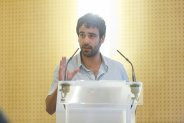Climate Change
Terrestrial Biodiversity
Mountains, Glaciers, Tundra & Permafrost
Climate Adaptation & Resilience
Post-Doctoral Fellowships
Portugal
2012.12.31
Interactions between permafrost and the lacustrine environment. Holocene environmental change in the Maritime Antarctic
In the ice-free areas of the Maritime Antarctic permafrost controls the terrestrial ecosystem. However, little is known on how permafrost and related geomorphic processes have responded to the warming trend recorded in this archipelago during the last decades. By studying the reaction of permafrost to warmer conditions in the past we may better assess the future impact of climate change on landscape dynamics.
My research is based on two hypotheses:
a) The detection of activity rates, spatial patterns and controls of present-day key-geomorphic processes and permafrost distribution will define their limiting climatic conditions that will be used to interpret the sedimentary record.
b) A multiproxy analysis of the biological, physical and geochemical properties of lake sediments will allow inferring the past environmental evolution – and the role played in it by permafrost and active layer dynamics - and Holocene climate variability in the Maritime Antarctic. Climate changes must have induced modifications on the erosion rates at the slopes, mass movements, active layer thickness, biological activity, etc.
Antarctica: understanding the past, to predict the future
My research will give answers to some uncertainties regarding the dynamics of the natural system in the Maritime Antarctic. We need to frame the recent warming within the natural climate variability of the last millennia in this particularly climate-sensitive region. As part of the duty that the Antarctic scientific community owes to society, researchers should provide new knowledge about its present and past natural climate evolution in order to forecast extreme climate events such as droughts and floods as well as to provide insights about the short-, mid- and long-term Earth climate evolution, in general, and about the recent warming that is affecting the global climate over the last decades. The scientific community needs to generate more data to better understand the negative (catastrophic?) effects that the present-day warming trend may trigger in the Antarctic, and thus in the whole climate system, in order to anticipate and mitigate its consequences as much as possible.
To add or modify information on this page, please contact us at the following address: community.research@axa.com

Marc
OLIVA
Institution
Instituto de Geografia e Ordenamento do Território
Country
Portugal
Nationality
Spanish
Related articles
Climate Change
Finance, Investment & Risk Management
Societal Challenges
Climate Adaptation & Resilience
Insurance & Risk Management
Environmental Justice
Civil Society & Governance
AXA Project
Italy
AXA Research Lab on Climate Change, Risk and Justice
In response to three research questions: How can the private and financial sectors contribute to a just transition to a... Read more

Gianfranco
PELLEGRINO


